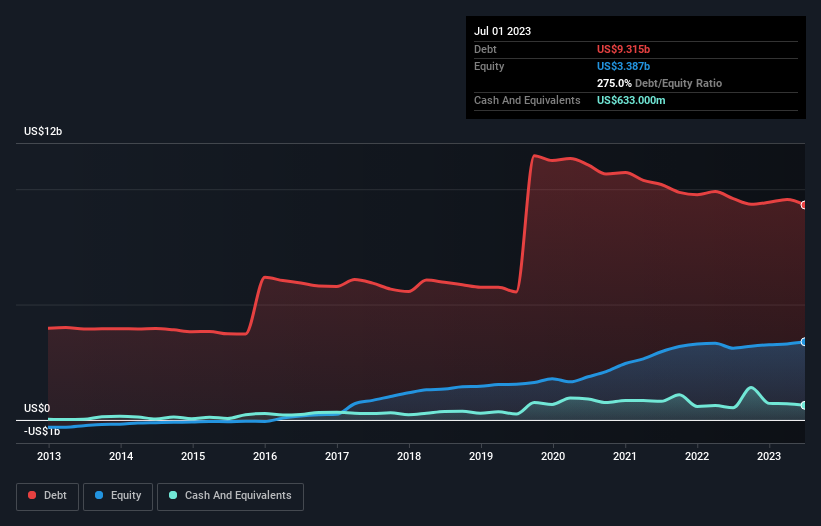- United States
- /
- Packaging
- /
- NYSE:BERY
These 4 Measures Indicate That Berry Global Group (NYSE:BERY) Is Using Debt Extensively

Some say volatility, rather than debt, is the best way to think about risk as an investor, but Warren Buffett famously said that 'Volatility is far from synonymous with risk.' It's only natural to consider a company's balance sheet when you examine how risky it is, since debt is often involved when a business collapses. As with many other companies Berry Global Group, Inc. (NYSE:BERY) makes use of debt. But is this debt a concern to shareholders?
What Risk Does Debt Bring?
Debt assists a business until the business has trouble paying it off, either with new capital or with free cash flow. Part and parcel of capitalism is the process of 'creative destruction' where failed businesses are mercilessly liquidated by their bankers. However, a more common (but still painful) scenario is that it has to raise new equity capital at a low price, thus permanently diluting shareholders. Of course, plenty of companies use debt to fund growth, without any negative consequences. The first thing to do when considering how much debt a business uses is to look at its cash and debt together.
View our latest analysis for Berry Global Group
What Is Berry Global Group's Net Debt?
As you can see below, Berry Global Group had US$9.32b of debt, at July 2023, which is about the same as the year before. You can click the chart for greater detail. However, because it has a cash reserve of US$633.0m, its net debt is less, at about US$8.68b.

A Look At Berry Global Group's Liabilities
The latest balance sheet data shows that Berry Global Group had liabilities of US$2.33b due within a year, and liabilities of US$10.8b falling due after that. On the other hand, it had cash of US$633.0m and US$1.75b worth of receivables due within a year. So its liabilities outweigh the sum of its cash and (near-term) receivables by US$10.8b.
This deficit casts a shadow over the US$6.77b company, like a colossus towering over mere mortals. So we definitely think shareholders need to watch this one closely. After all, Berry Global Group would likely require a major re-capitalisation if it had to pay its creditors today.
We use two main ratios to inform us about debt levels relative to earnings. The first is net debt divided by earnings before interest, tax, depreciation, and amortization (EBITDA), while the second is how many times its earnings before interest and tax (EBIT) covers its interest expense (or its interest cover, for short). The advantage of this approach is that we take into account both the absolute quantum of debt (with net debt to EBITDA) and the actual interest expenses associated with that debt (with its interest cover ratio).
Berry Global Group's debt is 4.3 times its EBITDA, and its EBIT cover its interest expense 4.0 times over. This suggests that while the debt levels are significant, we'd stop short of calling them problematic. Even more troubling is the fact that Berry Global Group actually let its EBIT decrease by 4.0% over the last year. If it keeps going like that paying off its debt will be like running on a treadmill -- a lot of effort for not much advancement. The balance sheet is clearly the area to focus on when you are analysing debt. But it is future earnings, more than anything, that will determine Berry Global Group's ability to maintain a healthy balance sheet going forward. So if you want to see what the professionals think, you might find this free report on analyst profit forecasts to be interesting.
Finally, a business needs free cash flow to pay off debt; accounting profits just don't cut it. So we clearly need to look at whether that EBIT is leading to corresponding free cash flow. During the last three years, Berry Global Group produced sturdy free cash flow equating to 54% of its EBIT, about what we'd expect. This cold hard cash means it can reduce its debt when it wants to.
Our View
We'd go so far as to say Berry Global Group's level of total liabilities was disappointing. But at least it's pretty decent at converting EBIT to free cash flow; that's encouraging. Overall, it seems to us that Berry Global Group's balance sheet is really quite a risk to the business. So we're almost as wary of this stock as a hungry kitten is about falling into its owner's fish pond: once bitten, twice shy, as they say. When analysing debt levels, the balance sheet is the obvious place to start. But ultimately, every company can contain risks that exist outside of the balance sheet. For instance, we've identified 2 warning signs for Berry Global Group (1 can't be ignored) you should be aware of.
If you're interested in investing in businesses that can grow profits without the burden of debt, then check out this free list of growing businesses that have net cash on the balance sheet.
Valuation is complex, but we're here to simplify it.
Discover if Berry Global Group might be undervalued or overvalued with our detailed analysis, featuring fair value estimates, potential risks, dividends, insider trades, and its financial condition.
Access Free AnalysisHave feedback on this article? Concerned about the content? Get in touch with us directly. Alternatively, email editorial-team (at) simplywallst.com.
This article by Simply Wall St is general in nature. We provide commentary based on historical data and analyst forecasts only using an unbiased methodology and our articles are not intended to be financial advice. It does not constitute a recommendation to buy or sell any stock, and does not take account of your objectives, or your financial situation. We aim to bring you long-term focused analysis driven by fundamental data. Note that our analysis may not factor in the latest price-sensitive company announcements or qualitative material. Simply Wall St has no position in any stocks mentioned.
About NYSE:BERY
Berry Global Group
Manufactures and supplies products in consumer and industrial end markets in the United States, Canada, Europe, and internationally.
Undervalued with mediocre balance sheet.

